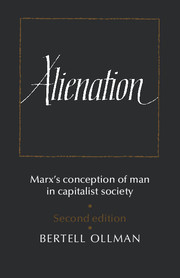Book contents
- Frontmatter
- Contents
- Preface to the second edition
- Note on translations
- Acknowledgements
- General introduction
- PART I PHILOSOPHICAL INTRODUCTION
- PART II MARX'S CONCEPTION OF HUMAN NATURE
- 7 Powers and needs
- 8 Natural man
- 9 Species man
- 10 Relating man to objects: orientation, perception
- 11 Appropriation
- 12 Nature as evidence
- 13 Activity, work, creativity
- 14 Man's social nature
- 15 The character of the species
- 16 Freedom as essence
- 17 Man, classes, people
- PART III THE THEORY OF ALIENATION
- PART IV CONCLUSION
- Appendix I In defense of the philosophy of internal relations
- Appendix II Response to my critics: more on internal relations
- Notes to the text
- Bibliography of works cited
- Index of names and ideas
- Cambridge Studies in the History and Theory of Politics
7 - Powers and needs
Published online by Cambridge University Press: 05 June 2012
- Frontmatter
- Contents
- Preface to the second edition
- Note on translations
- Acknowledgements
- General introduction
- PART I PHILOSOPHICAL INTRODUCTION
- PART II MARX'S CONCEPTION OF HUMAN NATURE
- 7 Powers and needs
- 8 Natural man
- 9 Species man
- 10 Relating man to objects: orientation, perception
- 11 Appropriation
- 12 Nature as evidence
- 13 Activity, work, creativity
- 14 Man's social nature
- 15 The character of the species
- 16 Freedom as essence
- 17 Man, classes, people
- PART III THE THEORY OF ALIENATION
- PART IV CONCLUSION
- Appendix I In defense of the philosophy of internal relations
- Appendix II Response to my critics: more on internal relations
- Notes to the text
- Bibliography of works cited
- Index of names and ideas
- Cambridge Studies in the History and Theory of Politics
Summary
Of Bentham, Marx declared, ‘he that would criticize all human acts, movements, relations, etc., by the principle of utility, must first deal with human nature in general, and then with human nature as modified in each historical epoch’. Instead, Bentham devotes little attention to human nature, taking the English shopkeeper as his all-purpose model. For him, ‘what is useful to this normal man and his world is absolutely useful. This yard-measure … he applied to past, present, and future.’ But Marx too has such a yard-measure in his conception of man, and he too applied it to all periods. Therefore, if Marx is right about Bentham, before we can comprehend Marx's own explanation and criticism of ‘all human acts, movements, relations, etc.’, of capitalism, its history and progress into communism, we must first learn how he deals with ‘human nature in general, and then with human nature as modified in each historical epoch’.
Marx's views on man have not been neglected by writers on Marxism, particularly in recent years. In answering whether Marx has an ethic I had occasion to mention several works which contain important accounts of these views. Nevertheless, human nature is most often treated as a cipher in Marx's system or described with a few simple adjectives. In those instances where it is taken as a significant variable, it has never been sufficiently integrated with Marx's other theories.
- Type
- Chapter
- Information
- AlienationMarx's Conception of Man in a Capitalist Society, pp. 73 - 76Publisher: Cambridge University PressPrint publication year: 1977



